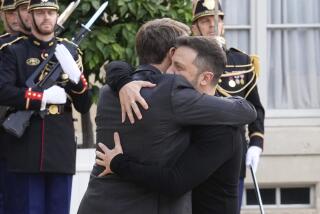Soviet Offer Won’t Divide Allies, Reagan Says
- Share via
CINCINNATI — The Soviet Union’s proposal to hold direct nuclear arms talks with France and Britain will not drive a wedge between the United States and its European allies, President Reagan said Thursday.
“This is between them and the Soviet Union,” Reagan said of the plan, contained in an arms package formally unveiled Thursday in Paris by Soviet leader Mikhail S. Gorbachev. “More power to them.”
In the past, Moscow repeatedly has tried to persuade Washington to include the French and British nuclear forces in U.S.-Soviet arms talks in Geneva. The United States has always refused, saying French and British missiles are outside American control.
Asked whether Gorbachev was trying to drive a wedge between the allies, the President said, “It certainly would drive a wedge if we arrogantly decided that we would negotiate on behalf of other countries and without their consent.”
Boosting Tax Reform
But “certainly, the United States cannot negotiate with the Soviets about what they’re going to do . . . with regard to the nuclear missiles of other countries,” Reagan said in response to reporters’ questions during a trip to Cincinnati to boost his tax revision plan.
However, a senior U.S. official said later: “It has been the Soviet objective for decades to divide the United States from our European allies.”
Together, France and Britain maintain about 150 nuclear missiles they are in the midst of modernizing--although both look to the United States to provide the overall nuclear umbrella for the West.
In his remarks, Reagan indicated that he is strongly skeptical of Moscow’s new arms initiative, which was privately conveyed to him last Friday by Soviet Foreign Minister Eduard A. Shevardnadze.
Most of the proposals--including a 50% reduction in U.S. and Soviet strategic nuclear weapons and a ban on space weapons--already had leaked out before Gorbachev made them public Thursday.
“Everything they are saying is a change in their position,” Reagan declared.
But he brushed aside the Soviet call for prohibition of all space weapons, which would include not only the space-based missile defense weapons envisioned in the “Star Wars” program, but also U.S. anti-satellite weapons.
Asked about Gorbachev’s warning that “hard times” lie ahead unless the United States forgoes the “Star Wars” plan, formally known as the Strategic Defense Initiative, Reagan said the Soviets are “very upset at the idea that they might not be the only ones that have a defense against nuclear weapons as well as having the offensive nuclear weapons.”
He vowed: “We’re not going to retreat from the research that could deliver the world a defense against these nuclear weapons and finally bring us to the realization that we should eliminate nuclear weapons entirely.”
In addition, he expressed strong doubts about Gorbachev’s offer to dismantle the shelters that contain Soviet SS-20 intermediate-range missiles aimed at Western Europe. The triple-warhead SS-20s long have been viewed by U.S. arms negotiators as an especially serious threat to European security and promise to be one of the thorniest issues during the Reagan-Gorbachev summit in Geneva next month.
“As I understand it,” Reagan said, “the only proposal they’ve made is one that would not be destroying any of their weapons--it would simply be moving them.” And, he added, “to simply drive them up to the Ural Mountains or someplace else and then say that they’re not a threat to Europe makes no sense.”
The 50% cut in nuclear arms proposed by Gorbachev would cover only those weapons with the capability of striking the territory of either superpower--thus excluding the SS-20s, which cannot reach the United States, but including the U.S. Pershing 2 and cruise missiles in Europe, which are targeted on the Soviet Union.
The senior Administration official also cautioned against euphoria over the Soviets’ plan to reduce offensive nuclear arms by 50%.
“Clearly, if you talk about some percentage, like 50%, it is a good idea to ask, ‘50% of what?’ ” he said. “We think 50% of some things is not anywhere nearly as meaningful as 50% of some others.”
In New York, where he is attending the opening of the U.N. General Assembly, Secretary of State George P. Shultz said the new Soviet proposal marks the first time since arms control talks were resumed earlier this year that Moscow has been willing to discuss offensive missiles. Although he indicated some skepticism over the details of the Soviet plan, he said it represents some procedural progress.
More to Read
Get the L.A. Times Politics newsletter
Deeply reported insights into legislation, politics and policy from Sacramento, Washington and beyond. In your inbox twice per week.
You may occasionally receive promotional content from the Los Angeles Times.










